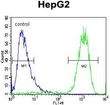ATP5PD (Center) Rabbit Polyclonal Antibody
Other products for "ATP5PD"
Specifications
| Product Data | |
| Applications | FC, IHC, WB |
| Recommended Dilution | ELISA: 1/1000. Western blotting: 1/100 - 1/500. Immunohistochemistry on paraffin sections: 1/50 - 1/100. Flow Cytometry: 1/10 - 1/50. |
| Reactivities | Human |
| Host | Rabbit |
| Isotype | Ig |
| Clonality | Polyclonal |
| Immunogen | KLH conjugated synthetic peptide between 75-105 amino acids from the Central region of human ATP5H |
| Specificity | This antibody reacts to ATP synthase subunit d. |
| Formulation | PBS containing 0.09% (W/V) sodium azide as preservative State: Aff - Purified State: Liquid purified Ig fraction |
| Concentration | lot specific |
| Purification | Affinity chromatography on Protein A |
| Storage | Store the antibody undiluted at 2-8°C for one month or (in aliquots) at -20°C for longer. Avoid repeated freezing and thawing. |
| Stability | Shelf life: one year from despatch. |
| Gene Name | Homo sapiens ATP synthase, H+ transporting, mitochondrial Fo complex subunit D (ATP5H), transcript variant 2 |
| Database Link | |
| Background | Mitochondrial ATP synthase catalyzes ATP synthesis, utilizing an electrochemical gradient of protons across the inner membrane during oxidative phosphorylation. It is composed of two linked multi-subunit complexes: the soluble catalytic core, F1, and the membrane-spanning component, Fo, which comprises the proton channel. The F1 complex consists of 5 different subunits (alpha, beta, gamma, delta, and epsilon) assembled in a ratio of 3 alpha, 3 beta, and a single representative of the other 3. The Fo seems to have nine subunits (a, b, c, d, e, f, g, F6 and 8). This gene encodes the d subunit of the Fo complex. Alternatively spliced transcript variants encoding different isoforms have been identified for this gene. In addition, three pseudogenes are located on chromosomes 9, 12 and 15. |
| Synonyms | ATP5H, My032, F1 F0 ATP synthase dubunit d, Complex V subunit d |
| Note | Molecular Weight: 18491 Da |
| Reference Data | |
| Protein Pathways | Alzheimer's disease, Huntington's disease, Metabolic pathways, Oxidative phosphorylation, Parkinson's disease |
Documents
| Product Manuals |
| FAQs |
{0} Product Review(s)
0 Product Review(s)
Submit review
Be the first one to submit a review
Product Citations
*Delivery time may vary from web posted schedule. Occasional delays may occur due to unforeseen
complexities in the preparation of your product. International customers may expect an additional 1-2 weeks
in shipping.






























































































































































































































































 Germany
Germany
 Japan
Japan
 United Kingdom
United Kingdom
 China
China





